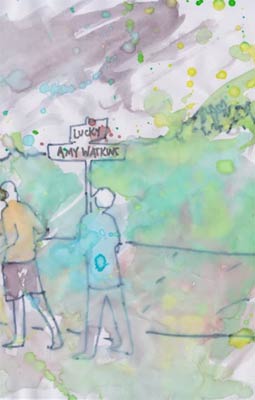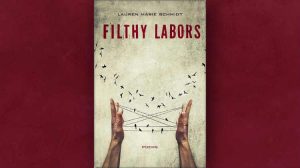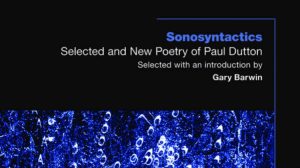Lucky by Amy Watkins / Bottlecap Press / 2019
 In Lucky (Bottlecap Press, 2019), a new chapbook from poet Amy Watkins, a woman looks back with wonder at the little girl lucky enough to be loved out of tough circumstances in rural Florida.
In Lucky (Bottlecap Press, 2019), a new chapbook from poet Amy Watkins, a woman looks back with wonder at the little girl lucky enough to be loved out of tough circumstances in rural Florida.
The author revealed on Twitter (@amykwatkins) that these poems take their titles from social media prompts, and indeed lines such as “I get super sick from…” and “A family heirloom I treasure …” have a Mad-Libs, slumber party truth-or-dare quality that sits comfortably beside the young subject of the prompts. Moving steadily through her adolescence via the collection, the narrator gains speed and confidence and is gradually willing to tell us more closely-held, careful-worded secrets.
Like the child who grows up too fast, Watkins knows how much to withhold and how much to hand us, with care, the parts of the narrator’s life that are now up for examination by other’s eyes. Our luck is her willingness to trust (to dare?) the reader, when the adults in this collection were less careful with their care.
Luck is layered in these poems and the narrator explores its nuances. There is the lucky girl who escapes a relative’s abuse in “If I could bring one person back to life…” where the narrative takes an unexpected turn beside a grandfather’s deathbed:
My cousin came and shook and cried.
I thought I knew what she was feeling.
Stitched throughout the family stories is also the girl who would be lucky to escape poverty and religious fundamentalism. Dollar store toys, high school dropouts, family secrets, women who go to church and men who do not, grandmothers who know when it is safe to speak and mothers who:
put her faith where she could afford to put it.
There is a sadness carefully pressed between these pages, a potent love and loss expressed in the text through details like dialect and setting:
…In their high school photos,
lined up along the wood-paneled walls
of my grandma’s trailer, my uncles look serious,
In “The videos that always make me laugh…” she sits in the living room watching America’s Funniest Home Videos with relatives:
lowest common denominator of early ‘90s culture:
American, this is you, a star for no talent, no
beauty, just the unpracticed pratfall
and belief in good humor, each of us saying,
“I wisht I’d had a camera.
I’da won ten thousand dollars.”
Faith healing and homemade tinctures share space with little girls listening to the grownups, smelling the joint, keeping quiet in the car.
Watkins’ narrator lives in the liminal spaces we inhabit when we love a family we must leave. The collection follows the young girl schooled at home, sheltered from the ways of the world, through her eventual graduation from college. In “One thing my dad always told me…”
When I graduated college, there were Latin words
printed beneath my name—his name—
and I was nine months pregnant.
He was so proud of both accomplishments.
Can a Florida poet write a collection without an alligator making an appearance? Yes, and we could use the interlude. The Sunshine State has a presence here that does not overpower. Watkins’ Florida is one that few outsiders know exist—cactus strewn across pastures, orange groves in a town named Frostproof, horses fenced in by daughters holding posthole diggers.
The poems here are free verse, largely lacking rhyme and stanza. The short lines and poem lengths partner well with the truth-telling girl giving us her stories. There is no need for embellishment or metaphor. We understand without needing justification. We believe her.
“A subject I always hated in school…” is the rare poem in this collection where the sentence is not finished. The question is revealed as moot. The poem describes the outsider status of a homeschooled child so sweetly and suddenly we are left holding the useless purple pencil box beside her, as shocked as she was to discover:
I had not imagined so many rules, spoken and
unspoken, the toy ban of the popularity
of Guess Jeans t-shirts tucked in, sleeves rolled.
I admire the teenaged girl who tells us everything. Especially in “I’d love to be 15 again to be able to…” where a crush is explained so much better than any Seventeen magazine article informed me back then:
…I dated
a boy I’d known since fifth grade,
who replaced his band nerd glasses
with contacts and revealed surprising
blue eyes and cut biceps. I had nothing else
to do that lonely year but surprise him back.
Lucky is the poet making herself visible after a sheltered upbringing that rendered little girls as good as gone, worth less.
Choosing truth over dare to craft the collection is how lucky we are as readers to gain entry into the full and frightening world of girls, with a watchful adult protector now loving herself through it. She is her own source of strength on the page, waiting at the end. A poet taking care with the truth.




Leave a Reply